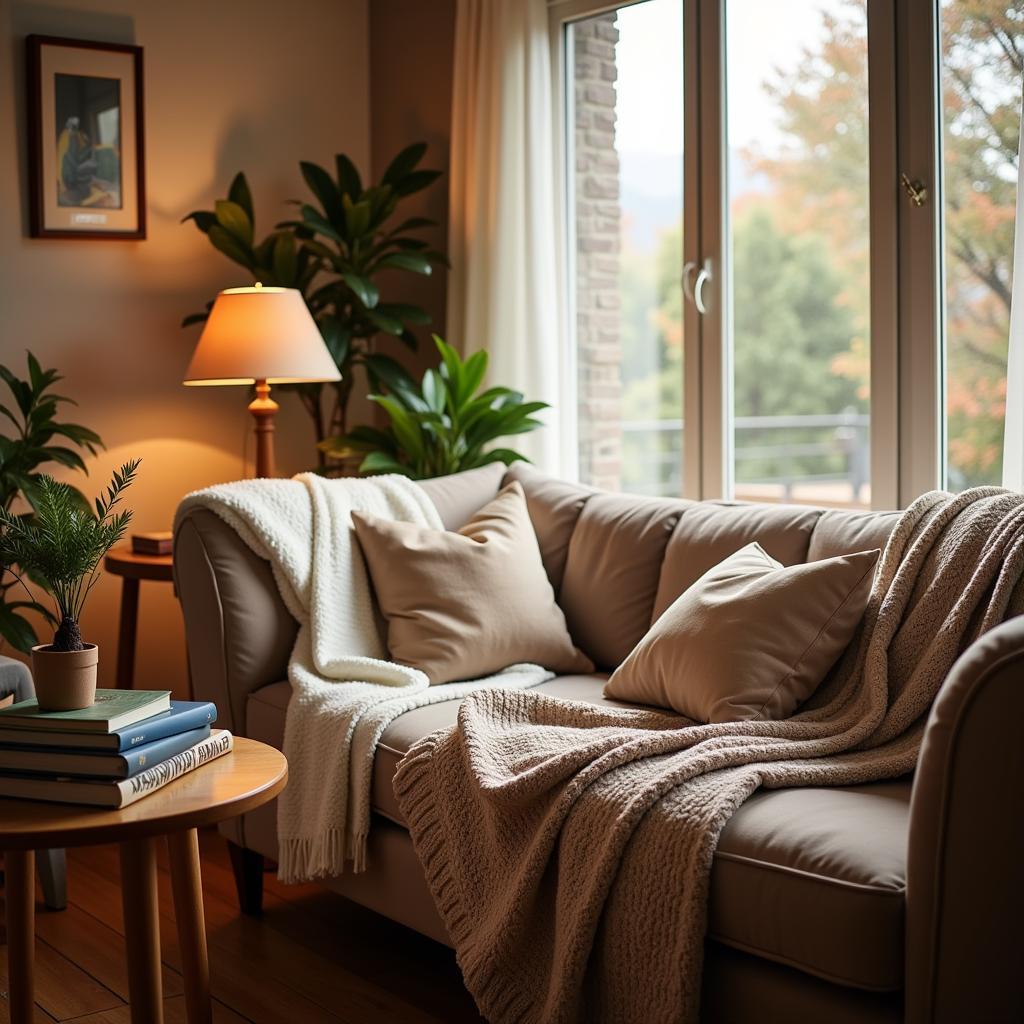Why Don’t I Want to Leave My House?
October 26, 2024The comfort and familiarity of home can be incredibly alluring, making us question why we’d ever want to leave. While there’s nothing wrong with enjoying your personal space, the feeling of being “stuck” inside can sometimes point to deeper reasons. Let’s explore some common factors that might have you thinking, “Why don’t I want to leave my house?” and how to navigate those feelings.
Is It Just Coziness, or Something More?
 Cozy Living Room Setup
Cozy Living Room Setup
Sometimes, the answer is simple: you’ve created a haven of peace and relaxation. A space that brings you joy and allows you to recharge. There’s absolutely nothing wrong with savoring those moments! However, if the desire to stay home becomes persistent and starts to impact your social life, work, or overall well-being, it might be time to dig a little deeper.
Unpacking the Potential Reasons:
1. Social Anxiety and Fear of Judgment:
For some, the outside world can feel overwhelming and anxiety-inducing. The fear of social situations, interacting with others, or facing potential judgment can be paralyzing, making home seem like the safest option.
Expert Insight: “It’s crucial to remember that you’re not alone in experiencing social anxiety,” says Dr. Sarah Jones, a licensed clinical psychologist. “Seeking professional help can provide you with coping mechanisms and strategies to manage these feelings and gradually re-engage with the world at your own pace.”
2. Depression and Low Mood:
When battling depression, even simple tasks can feel insurmountable. Low energy levels, lack of motivation, and feelings of hopelessness can make leaving the house seem daunting.
3. Stress and Burnout:
The constant demands of work, relationships, and daily life can lead to significant stress and burnout. In these instances, staying home can feel like a much-needed escape from the pressures of the outside world.
4. Agoraphobia:
In more severe cases, the reluctance to leave the house might be a symptom of agoraphobia, an anxiety disorder characterized by fear and avoidance of situations where escape might be difficult or help unavailable.
Finding Balance: Taking Steps Forward
- Acknowledge Your Feelings: The first step is to recognize and validate your emotions. It’s okay to feel this way, and understanding the root cause is crucial.
- Seek Professional Help: If your feelings are persistent and impacting your life, don’t hesitate to reach out to a therapist or counselor.
- Start Small: Begin with manageable steps, like stepping outside for a few minutes each day or engaging in a social activity you enjoy once a week.
- Create a Routine: Establishing a structured daily routine can provide a sense of normalcy and purpose, making it easier to motivate yourself to engage in activities outside the home.
- Connect with Loved Ones: Lean on your support system. Talking to friends and family about how you’re feeling can provide emotional support and encouragement.
When Staying Home Becomes a Concern
It’s important to distinguish between enjoying your personal space and complete isolation. If you find yourself withdrawing from activities you once enjoyed, neglecting responsibilities, or experiencing significant distress, it’s essential to seek professional guidance.
Expert Insight: “Early intervention is key,” says Dr. Mark Thompson, a psychiatrist specializing in anxiety disorders. “Addressing these feelings sooner rather than later can prevent them from escalating and significantly improve your quality of life.”
Reclaiming Your Life Beyond Your Doorstep
Remember, you are not defined by the walls of your home. Taking small steps, seeking support, and prioritizing your mental well-being can empower you to step back into the world and rediscover the joy and fulfillment it has to offer.
FAQ:
- Is it normal to enjoy staying home a lot? Absolutely! Everyone needs time to recharge, and home is often the most comfortable place to do so. It’s when staying home becomes excessive or starts to negatively impact your life that it might be a cause for concern.
- How do I know if I need professional help? If your feelings of wanting to stay home are persistent, causing you distress, or interfering with your daily life, it’s a good idea to reach out to a mental health professional.
- What are some strategies for managing social anxiety? Therapists often recommend techniques such as cognitive-behavioral therapy (CBT), mindfulness exercises, and gradual exposure to social situations.
Need Support? We’re Here for You.
If you’re struggling with wanting to leave your house or any other mental health concerns, remember that you’re not alone. Our team is here to provide support and guidance. Contact us at Phone Number: 0915117113, Email: [email protected] Or visit us at: To 3 Kp Binh An, Phu Thuong, Viet Nam, Binh Phuoc 830000, Viet Nam. We have a 24/7 customer support team.